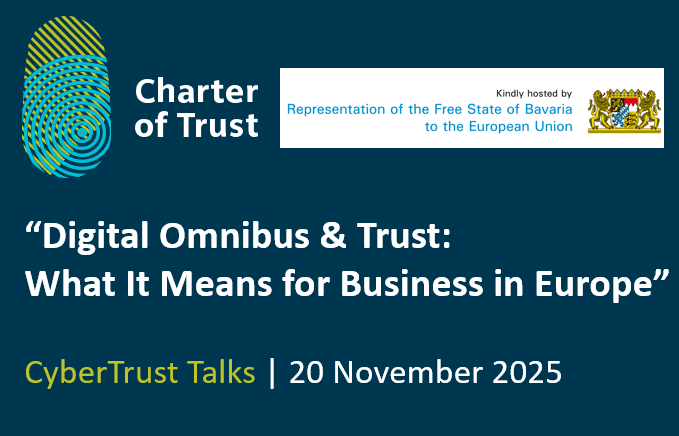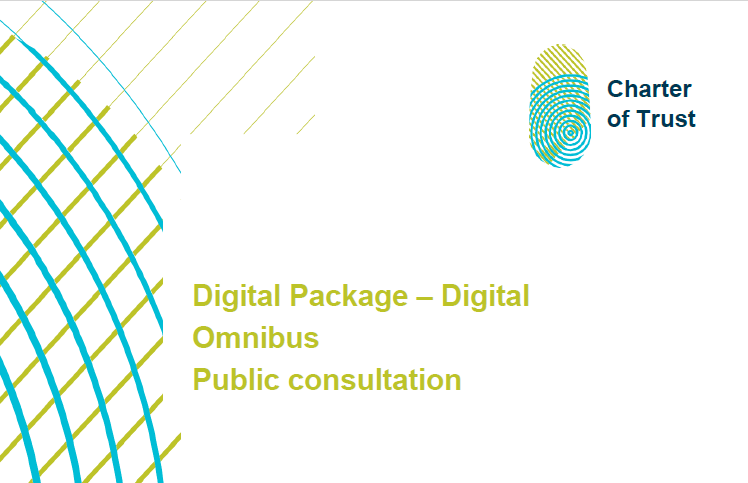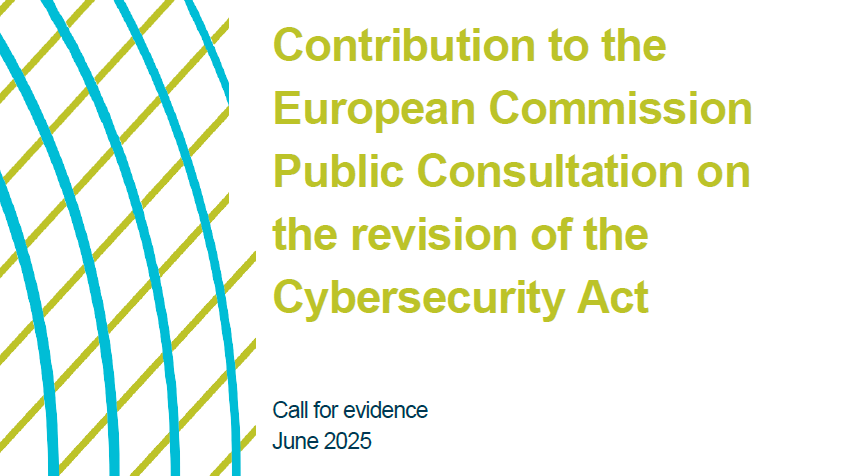

Activities
External Engagement
Foster dialogue and align international cyber regulations.
Objectives
As a collective of leading technology, cybersecurity, and industry stakeholders, the Charter of Trust Partners believe that a united and collaborative approach is essential for effectively combating cyber threats that endanger the security, privacy, and prosperity of our societies.
In today’s rapidly evolving geopolitical landscape marked by conflicts, economic challenges, an ever-growing threat landscape, addressing cybersecurity issues has become increasingly critical. As such, our mission is to foster public-private dialogue, prioritise greater alignment and reciprocity of cyber regulations internationally and advise regulators at the highest level on practicalities of implementation.

Our latest activities
Latest news, publications, events
What we have been up to

3rd CyberTrust Talk - Digital Omnibus & Trust - What it Means for Business in Europe?
Join us for a timely and dynamic edition focused on “Digital Omnibus & Trust: What It Means for Business in Europe” kindly hosted by the Representation of the Free State of Bavaria to the EU on November 20, 2025 at 11:00 AM (Central European Time) for a lunch event filled with insightful discussions on cybersecurity and trust in the digital age.
With the European Commission unveiling its landmark Digital Omnibus Package just one day before, this event is your exclusive opportunity to be among the first to explore its real-world impact on business and the digital economy across Europe.
What to Expect:
Opening remarks by:
Dr. Armin Hartmuth, Director, Representation of the Free State of Bavaria to the European Union
Dr. Sumit Chanda, COO, Atos Group Security & Business Lines CISO, and Co-Chair of the Charter of Trust.
Keynote Address:
Despina Spanou, Deputy Director General for Cybersecurity and Trust, European Commission (DG CNECT), will share first-hand insights into the objectives and expected impact of the Digital Omnibus Package.
Expert Panel Discussion featuring:Moderated by Sudhir Ethiraj, Global Head of Cybersecurity Office, CEO Business Unit Cybersecurity Services, TÜV SÜD.
Despina Spanou, Deputy Director General for Cybersecurity and Trust, European Commission (DG CNECT)
Kia Slæbæk Jensen, Cyber Advisor, Permanent Representation of Denmark to the EU
Suzanne Button, Field CTO EMEA, Elastic
Tomas Jakimavicius, Director European Government Affairs, Microsoft
Yana Humen, AI and Cybersecurity Policy Manager, Government and Regulatory Affairs, IBM
Interactive Q&A: Bring your questions and join the conversation on regulatory coherence, innovation, and the future of digital governance in Europe.
Closing remarks by Maria del Pino Gonzalez-Junco, Director of the Charter of Trust
Networking Lunch: Connect with peers, policymakers, and industry leaders in an informal setting.
Why attend?
Gain first-hand insights into the EU’s Digital Omnibus Package—straight from the policymakers and experts shaping it.
Understand the immediate implications for your business and how to navigate upcoming changes.
Be part of a strategic dialogue that could influence the future of digital regulation in Europe.
With the European Commission unveiling its landmark Digital Omnibus Package just one day before, this event is your exclusive opportunity to be among the first to explore its real-world impact on business and the digital economy across Europe.
What to Expect:
Opening remarks by:
Dr. Armin Hartmuth, Director, Representation of the Free State of Bavaria to the European Union
Dr. Sumit Chanda, COO, Atos Group Security & Business Lines CISO, and Co-Chair of the Charter of Trust.
Keynote Address:
Despina Spanou, Deputy Director General for Cybersecurity and Trust, European Commission (DG CNECT), will share first-hand insights into the objectives and expected impact of the Digital Omnibus Package.
Expert Panel Discussion featuring:Moderated by Sudhir Ethiraj, Global Head of Cybersecurity Office, CEO Business Unit Cybersecurity Services, TÜV SÜD.
Despina Spanou, Deputy Director General for Cybersecurity and Trust, European Commission (DG CNECT)
Kia Slæbæk Jensen, Cyber Advisor, Permanent Representation of Denmark to the EU
Suzanne Button, Field CTO EMEA, Elastic
Tomas Jakimavicius, Director European Government Affairs, Microsoft
Yana Humen, AI and Cybersecurity Policy Manager, Government and Regulatory Affairs, IBM
Interactive Q&A: Bring your questions and join the conversation on regulatory coherence, innovation, and the future of digital governance in Europe.
Closing remarks by Maria del Pino Gonzalez-Junco, Director of the Charter of Trust
Networking Lunch: Connect with peers, policymakers, and industry leaders in an informal setting.
Why attend?
Gain first-hand insights into the EU’s Digital Omnibus Package—straight from the policymakers and experts shaping it.
Understand the immediate implications for your business and how to navigate upcoming changes.
Be part of a strategic dialogue that could influence the future of digital regulation in Europe.
Read more
November 5, 2025

Read the Charter's contribution to the European Commission's public consultation on the Digital Omnibus Package
The rapid expansion of EU digital regulation has strengthened security, privacy, and trust, but it has also created overlapping obligations, inconsistent timelines, and administrative complexity. The Digital Omnibus Package provides a timely opportunity to streamline these rules, ensure greater coherence, and enable businesses to focus resources on resilience and innovation rather than redundant compliance tasks.
The Charter of Trust welcomes the Commission’s initiative to harmonize digital regulations across the EU, aiming to reduce administrative burdens while maintaining high standards of security and privacy. Representing the unified views of its Partners, this paper addresses all key legislation within the scope of the Digital Omnibus and offers comprehensive recommendations. It emphasizes the need for a unified incident reporting system, risk-based notification requirements, and fair compliance processes to minimize regulatory overlap. The Charter calls for clearer liability clauses, global recognition of certifications, and stronger supply chain security.
In data regulation, the Charter advocates ensuring alignment between the rules on data intermediation services under the DGA and B2B data sharing under the Data Act and extending exemptions to mid-cap companies, all while safeguarding trade secrets. For artificial intelligence, the paper recommends a phased approach to new requirements, integrated conformity assessments, harmonized compliance templates, and clear definitions, supported by sector-specific guidance and transparent AI categorization. The Charter also encourages the European Commission to ensure that ePrivacy reform is future-proof, fosters innovation, and reflects the needs of both businesses and consumers. Finally, it recommends robust security standards and cross-border recognition for the EU Business Wallet, with industry involvement in technical standards and integration with data access systems.
Collectively, these measures are designed to foster innovation, resilience, and trust in the EU’s digital landscape, allowing businesses to thrive in a coherent and future-ready regulatory environment.
The Charter of Trust welcomes the Commission’s initiative to harmonize digital regulations across the EU, aiming to reduce administrative burdens while maintaining high standards of security and privacy. Representing the unified views of its Partners, this paper addresses all key legislation within the scope of the Digital Omnibus and offers comprehensive recommendations. It emphasizes the need for a unified incident reporting system, risk-based notification requirements, and fair compliance processes to minimize regulatory overlap. The Charter calls for clearer liability clauses, global recognition of certifications, and stronger supply chain security.
In data regulation, the Charter advocates ensuring alignment between the rules on data intermediation services under the DGA and B2B data sharing under the Data Act and extending exemptions to mid-cap companies, all while safeguarding trade secrets. For artificial intelligence, the paper recommends a phased approach to new requirements, integrated conformity assessments, harmonized compliance templates, and clear definitions, supported by sector-specific guidance and transparent AI categorization. The Charter also encourages the European Commission to ensure that ePrivacy reform is future-proof, fosters innovation, and reflects the needs of both businesses and consumers. Finally, it recommends robust security standards and cross-border recognition for the EU Business Wallet, with industry involvement in technical standards and integration with data access systems.
Collectively, these measures are designed to foster innovation, resilience, and trust in the EU’s digital landscape, allowing businesses to thrive in a coherent and future-ready regulatory environment.
Read more
October 20, 2025

Contribution to the EU Commission Public Consultation on the revision of the Cybersecurity Act
The Charter of Trust welcomes the opportunity to participate in the European Commission’s public consultation on the revision of the Cybersecurity Act. As a coalition united by the goal of strengthening digital trust, we are pleased to share our consolidated response and recommendations.
We support Policy Option 2, which focuses on targeted regulatory measures that address key challenges without creating unnecessary complexity. In this context, we emphasize the need to enhance the role and resources of ENISA, to ensure effective implementation of both current legislation and the European Cybersecurity Certification Framework (ECCF).
Our recommendations aim to improve transparency, collaboration, and efficiency across the EU’s cybersecurity landscape. These include:
- Introducing clear timelines for the development of certification schemes.
- Enhancing stakeholder engagement throughout the process.
- Establishing more structured communication channels between ENISA, the Stakeholder Cybersecurity Certification Group (SCCG), and sectoral ISACs (Information Sharing and Analysis Centers).
We call for a stronger ECCF, one that is transparent, inclusive, and aligned with international standards to foster global interoperability and ease compliance for organizations across borders. Equally critical is the harmonization of certification practices across EU member states and the mutual recognition of certifications to minimize regulatory fragmentation.
The Charter of Trust advocates for technically robust, standards-based certification schemes, with well-defined roles and responsibilities. We also stress the need for clarity on the interplay between voluntary and mandatory certifications, particularly in relation to the upcoming Cyber Resilience Act (CRA).
To streamline compliance and reduce administrative burden, we propose a unified, risk-based incident reporting regime that consolidates requirements under regulations such as NIS2, CRA, GDPR, and DORA. This would not only simplify reporting for organizations but also enhance the EU’s overall cyber resilience. In addition, we recommend incorporating liability protections and grace periods for incident disclosure.
Finally, we urge the Commission to strengthen supply chain security by adopting a risk-based classification approach and establishing baseline cybersecurity requirements for ICT suppliers.
The Charter of Trust remains fully committed to supporting the European Commission in shaping a secure, resilient, and trusted digital future for Europe. We look forward to continued collaboration in building a cybersecurity framework that meets the needs of all stakeholders, today and in the years to come.
We support Policy Option 2, which focuses on targeted regulatory measures that address key challenges without creating unnecessary complexity. In this context, we emphasize the need to enhance the role and resources of ENISA, to ensure effective implementation of both current legislation and the European Cybersecurity Certification Framework (ECCF).
Our recommendations aim to improve transparency, collaboration, and efficiency across the EU’s cybersecurity landscape. These include:
- Introducing clear timelines for the development of certification schemes.
- Enhancing stakeholder engagement throughout the process.
- Establishing more structured communication channels between ENISA, the Stakeholder Cybersecurity Certification Group (SCCG), and sectoral ISACs (Information Sharing and Analysis Centers).
We call for a stronger ECCF, one that is transparent, inclusive, and aligned with international standards to foster global interoperability and ease compliance for organizations across borders. Equally critical is the harmonization of certification practices across EU member states and the mutual recognition of certifications to minimize regulatory fragmentation.
The Charter of Trust advocates for technically robust, standards-based certification schemes, with well-defined roles and responsibilities. We also stress the need for clarity on the interplay between voluntary and mandatory certifications, particularly in relation to the upcoming Cyber Resilience Act (CRA).
To streamline compliance and reduce administrative burden, we propose a unified, risk-based incident reporting regime that consolidates requirements under regulations such as NIS2, CRA, GDPR, and DORA. This would not only simplify reporting for organizations but also enhance the EU’s overall cyber resilience. In addition, we recommend incorporating liability protections and grace periods for incident disclosure.
Finally, we urge the Commission to strengthen supply chain security by adopting a risk-based classification approach and establishing baseline cybersecurity requirements for ICT suppliers.
The Charter of Trust remains fully committed to supporting the European Commission in shaping a secure, resilient, and trusted digital future for Europe. We look forward to continued collaboration in building a cybersecurity framework that meets the needs of all stakeholders, today and in the years to come.
Read more
June 20, 2025



